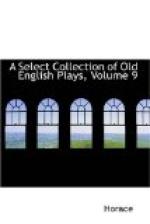[318] [This and Chanter are the names of dogs. Auditus fancies himself a huntsman.]
[319] Counter is a term belonging to the chase. [Gascoigne,] in his “Book of Hunting,” 1575, p. 243, says, “When a hounde hunteth backwardes the same way that the chase is come, then we say he hunteth counter. And if he hunt any other chase than that which he first undertooke, we say he hunteth change.” So in “Hamlet,” act iv. sc. 5—
“How cheerfully on the
false trail they cry!
O, this is counter,
you false Danish dogs.”
See Dr Johnson’s note on this passage.
[320] [The author may have had in his mind an anecdote related of Queen Elizabeth and Sir Edward Dyer. See the “New London Jest Book,” p. 346.]
[321] [Flatulent.]
[322] [Rett and Cater appear to be the names of dogs. Edits. print ware wing cater.]
[323] [See note at p. 367.]
[324] Idle, lazy, slothful. Minsheu derives it from the French lasche, desidiosus.
[325] [See a review of, and extracts from, this very curious play in Fry’s “Bibliographical Memoranda,” 1816, pp. 345-50.]
[326] Catalogue of the library of John Hutton. Sold at Essex House, 1764, p. 121. The whole title of the tract, which Mr Reed does not appear to have seen, as he quotes it only from a sale catalogue, is as follows:—“Three Miseries of Barbary: Plague, Famine, Ciuill warre. With a relation of the death of Mahamet the late Emperour: and a briefe report of the now present Wars betweene the three Brothers. Printed by W.I. for Henry Gosson, and are to be sold in Pater noster rowe, at the signe of the Sunne.” It is without date, and the name of the author, George Wilkins, is subscribed to a dedication, “To the right worshipfull the whole Company of Barbary Merchants.” The tract is written in an ambitious style, and the descriptions are often striking; but there is nothing but the similarity of name to connect it with “The Miseries of Enforced Marriage.”—Collier.
[327] [Hazlitt’s “Handbook,” 1867, p. 656.]
[328] [Not in the old copies.]
[329] “This comedy (as Langbaine improperly calls it) has been a great part of it revived by Mrs Behn, under the title of ’The Town Fop, or Sir Timothy Tawdry.’”
[330] These were among the articles of extravagance in which the youth of the times used to indulge themselves. They are mentioned by Fennor, in “The Compters Commonwealth,” 1617, p. 32: “Thinkes himselfe much graced (as to be much beholding to them) as to be entertained among gallants, that were wrapt up in sattin suites, cloakes lined with velvet, that scorned to weare any other then beaver hats and gold bands, rich swords and scarfes, silke stockings and gold fringed garters, or russett bootes and gilt spurres; and so compleate cape ape, that he almost dares take his corporal oath the worst of them is worth (at least) a thousand a yeare, when heaven knows the best of them all for a month, nay, sometimes a yeare together, have their pockets worse furnished then Chandelors boxes, that have nothing but twopences, pence, halfe pence, and leaden tokens in them.”




